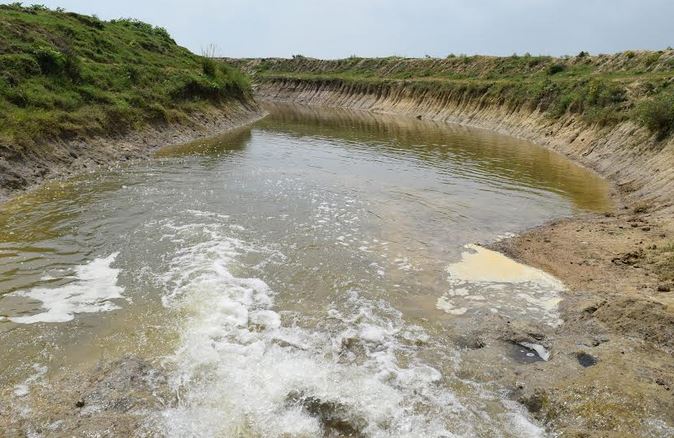
RAJSHAHI, April 27, 2022 (BSS)- Eight more canals were re-excavated in
the high Barind area aimed at reducing the gradually mounting pressure on
underground water through promoting surface water irrigation.
"We have brought the canals with around 4.78-kilometer in length which
were derelict and unfit for use under re-excavation in eight upazilas of
Rajshahi, Chapainawabganj and Naogaon districts," said Jahangir Alam Khan
today.
Around 24,200 people, including 12,544 women and 2,586 ethnic
minorities, are being benefited from the canals. The beneficiaries are using
the canal water to irrigate 350 hectares of farming fields of wheat, mustard,
pulse and other rabi crops as supplementary irrigation.
Jahangir Khan, Coordinator of Integrated Water Resource Management
(IWRM) Project, said the venture has created scopes of saving around 24.20
lakh liter of underground water in terms of irrigation use, while 18.43 lakh
liters for other household and livestock purposes. The IWRM project is being
implemented in drought-affected 39 Union Parishads and three Pourasavas in
Rajshahi, Chapainawabganj and Naogaon districts since 2015.
DASCOH Foundation and Swiss Red Cross are jointly implementing the
project supported by Switzerland with the main thrust of protecting crops
from any drought like situation. Marginalized farmers, including ethnic
minority ones, are seen deriving benefits of the re-excavated canals for
irrigation purposes in Barind areas for the last couple of years.
Farmers were gradually becoming accustomed to irrigating their cropping
fields with canal water in the water-stressed Barind area, contributing a lot
towards boosting crop production.
"We are getting water for irrigating our croplands round the year from
the canal at Paharpur village in Godagari upazila of Rajshahi," said Ruhul
Amin, 53, a farmer of the same village.
Expressing his happiness over the canal water based irrigation in the
current summer vegetable season Amin said canal water contains humus which is
important for soil fertility as well as boosting crop yield.
"We are so happy with getting chances of irrigation using surface water
round the year," Bishal Kisku Mormu, 48, another farmer of Chorkhor village
in Tanore Upazila, said.
Alivia Saren, 39, a resident of Veempara village in the same upazila,
had brought three bigha of land under wheat farming through using the canal
water irrigation in last season and got satisfactory yield of the cash crop.
Like them, canal water irrigation has made thousands of farmers happy in
the high Barind area as their dependence on deep tube wells and rainfall has
been reduced to some extent.
Ataur Rahman, Chairman of Badhair Union Parishad, said canal water
irrigation has been contributing Transplanted Aman (T-Aman) paddy and other
seasonal crops in the high Barind tract through lessening the gradually
mounting pressure on underground water.
He said canal water has become blessings for many farmers in terms of
surviving their crops. He personally had brought ten bigha of land under
transplanted aman paddy cultivation through using water from a nearby re-
excavated canal. Prof Mijanur Rahman from Department of Geography and
Environmental Sciences in Rajshahi University underlined the need for re-
excavation of more derelict water bodies like canals, ponds and wetlands for
the conservation of surface water to maintain ecological balance in the
region.
He said a large number of water bodies have become derelict due to the
adverse impacts of climate change, posing a serious threat to the ecosystem
and livelihood condition of the people.
Substantial and sustainable conservation of surface water resources
along with its careful use can be a vital means of supplementing the
government efforts of successful implementation of Delta Plan 2100.